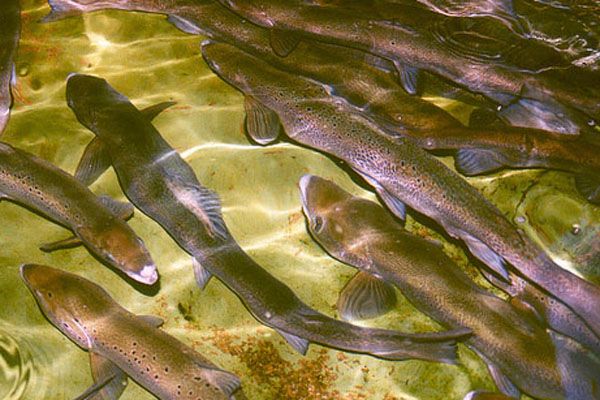Training A Fish To Survive

(ISNS) -- Improving the intelligence of fish raised in hatcheries so they can learn to catch food and evade predators when they are released into the sea may help save depleting fish stocks, American and Norwegian scientists report.
Just making the tanks they are born in more interesting may do the job.
While the words "intelligence" and "fish" do not usually appear in the same sentence, Victoria Braithwaite, professor of fisheries and biology at Pennsylvania State University, think fish are smarter than most people give them credit for.
"You just have to ask them the right questions in the right way," she said.
By testing Atlantic salmon raised in tanks in Norway, the scientists found that changing the environment in the hatchery – adding objects and periodically moving them around – made for smarter fish.
The work is published in the Proceedings of the Royal Society B, and was done by researchers at Penn State and the University of Bergen in Norway, funded by the Research Council of Norway.
The philosophy has always been that if you release vast numbers of fish into the sea, enough of them will survive to replenish declining stocks, but that doesn't seem to be working, Braithwaite said. Many of the fish either starve to death or become meals for larger fish.
Sign up for the Live Science daily newsletter now
Get the world’s most fascinating discoveries delivered straight to your inbox.
Braithwaite, author of the book "Do Fish Feel Pain?" said the fish grown in hatcheries do poorly once released into the wild. They were well-fed in the tanks, and since there are no predators where they grew up, they are not conditioned to know when they are in danger, she explained.
"Predation pressures can be cruel," she said. "You have one chance to survive and if you don't get it right the first time, you don't get a second chance."
While some survival techniques are instinctive, hard-wired into the fishes' genes, early experience can play a significant role in helping the fish survive. Essentially, she said, fish can be conditioned.
"In terms of fish intelligence, there is little difference between fish and the rest of vertebrates," said Culum Brown, director of advanced biology at Macquarie University in Sydney, Australia, who also has worked with Atlantic salmon. "They can do pretty much anything the rest of the verts can do."
Salmon, cod, and trout are the most common fish raised in hatcheries, and the Norwegian experiment involved salmon, although Braithwaite said she thinks the results will apply to most hatchery-raised fish.
Tanks are usually bare of objects -- just fish, the walls and water. Their world is boring and monotonous.
The researchers added rocks and pebbles to the tanks and plastic plants weighted down so they floated upright. The objects were moved around once a week so the environment kept changing. The researchers then tested the salmon in mazes as if they were laboratory rats.
The salmon that were raised in the more interesting tanks did better escaping the maze than those that were not, and they got better with each attempt.
The fish were then sacrificed, and their brains were found to be different as well. The region of the brain having to do with learning was larger in the enriched fish than those raised in standard tanks.
"This work is the logical progression from previous studies that have shown differences in both the brains and behavior of hatchery versus wild fishes," Brown said. "Our own studies on Atlantic salmon, for example, showed fish reared in enriched environments showed greater propensity to generalize their foraging behavior towards novel prey."
Whether the theory is right -- that those enriched fish will survive better in the wild --remains to be proven, he said.
Inside Science News Service is supported by the American Institute of Physics. Joel Shurkin is a freelance writer based in Baltimore. He is the author of nine books on science and the history of science, and has taught science journalism at Stanford University, UC Santa Cruz and the University of Alaska Fairbanks.












